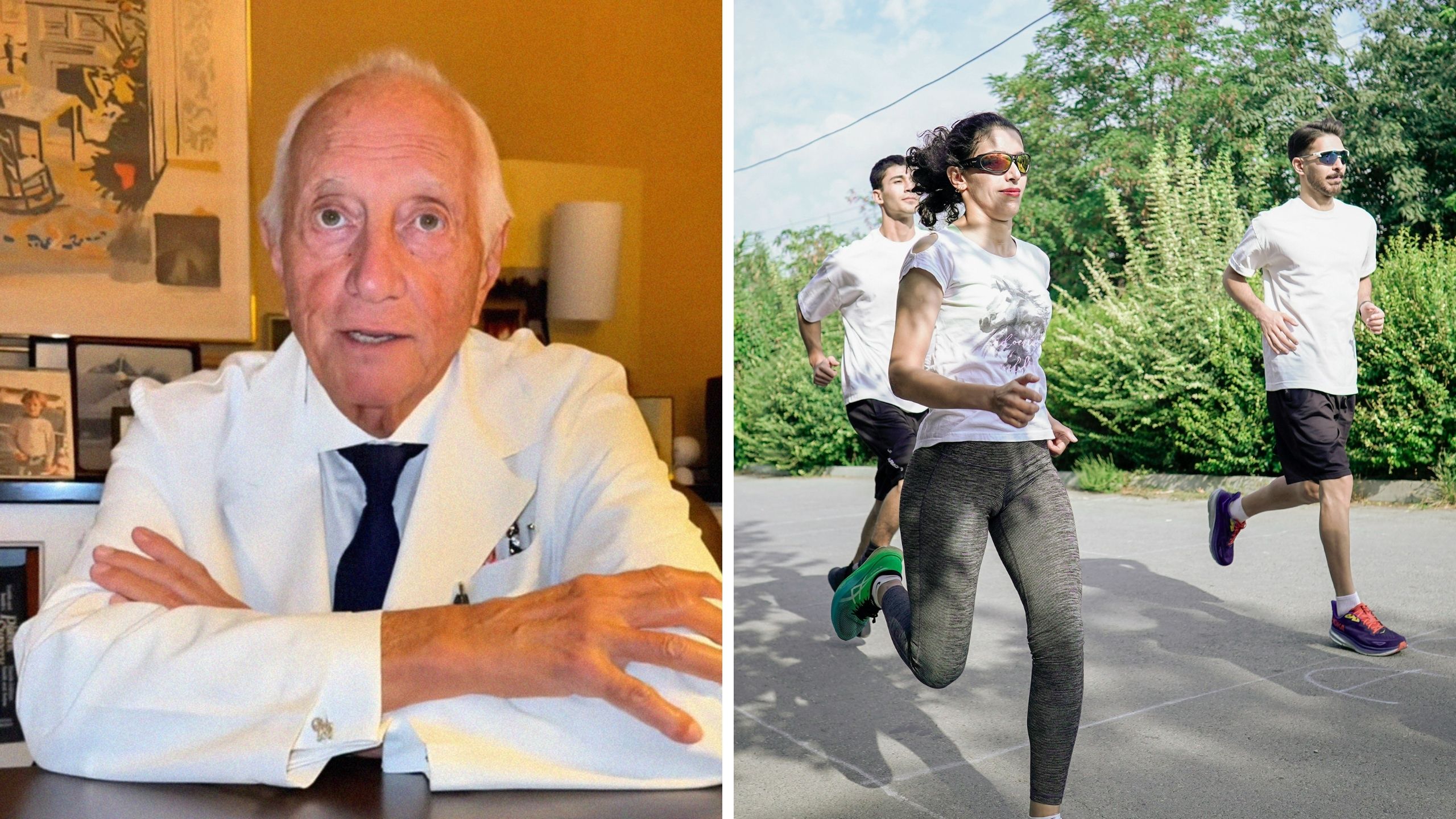
A board-certified plastic surgeon’s viral video telling people to stop running has racked up millions of views—and raised serious concerns among medical professionals.
While the doctor claims running destroys your joints and ages your face, the broader medical community says his advice contradicts decades of research showing running’s significant health benefits.
Plastic Surgeon Claims Running Causes Premature Aging
In a viral video with more than 16.5 million views, Dr. Gerald Imber (@geraldimbermd), a board-certified plastic surgeon and self-described anti-aging expert, made sweeping claims against running as exercise.
“Don’t run, period. I’m so tired of saying it,” he said.
“Running feels great. That’s terrific. You get a high from it. That’s terrific,” he says. “Your knees go, your ankles go, your hip goes, your skin goes, and your face sags.”
Dr. Imber argues that the physical toll isn’t worth whatever benefits people get from running.
“That’s a pretty high price, and I think and that’s not enough. On top of it all, you’re speeding up the fact that you’re going to get shorter from the constant pounding,” he continues.
His solution? Switch to cycling instead.
“For me, that’s enough. Why don’t you just get on a bike and forget about running?” he said.
What Medical Research Actually Says
Dr. Imber’s claims directly contradict the vast body of medical research on running and health.
Does running ruin your joints?
Contrary to Dr. Imber’s claims about joint damage, medical experts say the opposite is true.
According to Northwestern Medicine, multiple studies show that regular running strengthens the joints and actually protects against the development of osteoarthritis later in life.
“It’s very common for people to say, ‘How do you run? Doesn’t that ruin your knees?'” says Dr. Steven Mayer, a physician in physical medicine and rehabilitation at Northwestern Medicine Orthopaedics. “There have been several recent studies that have debunked that myth. In fact, they have shown the opposite—that running tends to be protective of knee arthritis.”
When runners do experience knee pain, Northwestern Medicine notes that the culprits are typically iliotibial band syndrome or patellofemoral pain syndrome—not arthritis. Both conditions can usually be treated with moderate physical therapy and strength training, and rarely require surgery.
Dr. Mayer and his colleague, Dr. Jeffrey Senall, an orthopaedic surgeon at Northwestern Medicine, emphasize that runners should pay attention to pain and have it evaluated early to prevent further injury. But the idea that running itself destroys your knees? That’s simply not supported by evidence.
Will running make you age faster?
Dr. Imber’s claim that running causes facial sagging is another myth not supported by medical evidence. While some people refer to “runner’s face” as a phenomenon where long-distance runners develop leathery or sagging skin, running itself doesn’t cause these changes, Health reported.
“It’s an urban myth to associate running with skin sagging—the physical activity of running itself is not causing the texture or the elasticity of your skin to change,” Dr. Susan Massick, a board-certified dermatologist at The Ohio State University Wexner Medical Center, told Health.
What can contribute to aged-looking skin in runners? Lack of sun protection. Doing it outdoors without proper sunscreen exposes the face to harmful UV rays, which can lead to wrinkles, sun spots, and sagging skin. Weight loss from running may also reduce facial volume, creating a thinner appearance, but that’s related to body fat percentage, not the act of running itself.
Health notes that runners can protect their skin by wearing broad-spectrum sunscreen with SPF 30 or higher, running during non-peak sun hours (avoiding 10 AM to 4 PM), wearing hats and sunglasses, staying hydrated, and using a daily moisturizer. The solution isn’t to stop doing it—it’s to protect your skin while you do it.
Yes, running makes you shorter. But not forever.
Dr. Imber’s claim about the activity making you shorter is technically true, but only temporarily, and it’s not unique to running.
According to Runner’s World, runners can lose almost half an inch in height during a marathon. This happens because back muscles tense under strenuous conditions and fluid is lost between the intervertebral disks.
However, this height loss is completely temporary, and your height is fully restored when fluid levels are replaced. All humans experience temporary height loss throughout the day due to spinal compression. This happens whether you run or not. There’s no evidence that recreational running causes permanent height loss beyond normal aging.
@geraldimbermd Get on a bike. It’s better for you. #fitnesstips #womensfitness #healthylifestyle #naturalfacelift #dailyhabits ♬ original sound – Gerald Imber, MD
Commenters are in favor
“Don’t gotta tell me twice,” a top comment read.
“Runners face is no joke,” a person said.
“Laziness has saved me again,” another wrote.
“Never thought I’d see anti run propaganda,” a commenter pointed out.
The Mary Sue reached out to Dr. Imber for comment via email and Instagram direct message.
Have a tip we should know? [email protected]







